|
|
|
Sort Order |
|
|
|
Items / Page
|
|
|
|
|
|
|
| Srl | Item |
| 1 |
ID:
084034
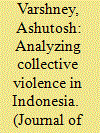

|
|
|
| 2 |
ID:
104838
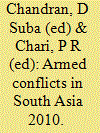

|
|
|
|
|
| Publication |
New Delhi, Routledge, 2011.
|
| Description |
xi, 233p.
|
| Standard Number |
9780415612562, hbk
|
|
|
|
|
|
|
|
|
|
|
|
Copies: C:1/I:0,R:0,Q:0
Circulation
| Accession# | Call# | Current Location | Status | Policy | Location |
| 056108 | 303.6405/CHA 056108 | Main | On Shelf | General | |
|
|
|
|
| 3 |
ID:
121901
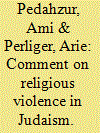

|
|
|
|
|
| Publication |
2013.
|
| Summary/Abstract |
Gideon Aran and Ron Hassner, both distinguished scholars of religious violence, offer a rich discussion of violence in Judaism. They guide the reader on a tour from the past to the present, making stops at crucial crossroads and offering a sophisticated discussion in which they draw lines between biblical texts, culture, and contemporary political events. The authors' backgrounds (Aran is an anthropologist and Hassner is a political scientist) turn the text into a compelling exploration of the phenomenon and a real tour de force.
|
|
|
|
|
|
|
|
|
|
|
|
|
|
|
|
| 4 |
ID:
094331
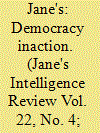

|
|
|
| 5 |
ID:
129084
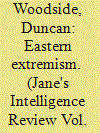

|
|
|
| 6 |
ID:
127333
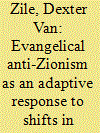

|
|
|
|
|
| Publication |
2013.
|
| Summary/Abstract |
Since the founding of the Jewish state in 1948, Evangelical Protestants in the United States have been regarded-with good reason-as Israel's most reliable supporters. In 2008, Jody C. Baumgartner and a number of other researchers reported that Evangelicals are "more likely than other Americans to have sympathy for Israel in its dispute with the Palestinians and to agree that the United States should take Israel's side more often in the Middle East."1 More recently, a poll conducted by the Pew Charitable Trust indicated that Evangelicals are more likely than other American Jews to believe that God gave the land to the Jewish people.2 In addition to the belief that God's promises endure forever, much Evangelical support for Israel is motivated by an understanding of the religious component of Arab hostility toward Israel. Evangelicals, Baumgartner and her colleagues reported, are "significantly more likely than other Americans to agree that Islam is a more violent religion than Christianity, Judaism, or Hinduism."3 Other factors related to Evangelical support for Israel include an adherence to premillenial dispensationalism (an eschatology that posits that the return of the Jews to their homeland is a precursor to the return of Jesus Christ),4 gratitude to the Jewish people for their scriptures, and remorse over the Holocaust.5
|
|
|
|
|
|
|
|
|
|
|
|
|
|
|
|
| 7 |
ID:
162114
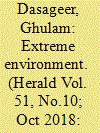

|
|
|
| 8 |
ID:
049045
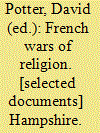

|
|
|
|
|
| Publication |
Hampshire, macmillan Press, 1997.
|
| Description |
xxi, 274p.: maps, tableHbk
|
| Standard Number |
033364798X
|
|
|
|
|
|
|
|
|
|
|
|
Copies: C:1/I:0,R:0,Q:0
Circulation
| Accession# | Call# | Current Location | Status | Policy | Location |
| 039904 | 944.03/POT 039904 | Main | On Shelf | General | |
|
|
|
|
| 9 |
ID:
183459
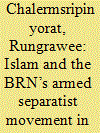

|
|
|
|
|
| Summary/Abstract |
This article examines the roles of religion in the contemporary separatist movement in southern Thailand, whose violent campaigns have dramatically surged since 2004. It locates Islam in the region’s own political and historical context rather than viewing it as an expression of transnational terrorism or casting Islam as of secondary importance in what is seen as primarily an ethno-nationalist struggle, as some scholars have done. I argue that Islam served as a powerful motivational frame that drove thousands of Malay Muslims to take part in the violent struggle led by the Patani Malay National Revolutionary Front (BRN), as a sacred justification for their violent actions and as a blueprint of a new socio-political order. The conflict was elevated into a cosmological battle and the fighters’ actions were fundamentally framed within Islamic theology. Islamic law was employed as a primary reference for the justification and regulation of violent attacks. This article also demonstrates that Islam is part of the BRN’s political agenda and fighters have turned their perceived Islamic beliefs and norms into military actions. However, its ideological orientation is at variance with that of the transnational jihadists. This article offers a more nuanced approach to understanding the religious dimensions of this conflict.
|
|
|
|
|
|
|
|
|
|
|
|
|
|
|
|
| 10 |
ID:
127222
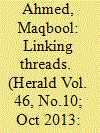

|
|
|
| 11 |
ID:
085018
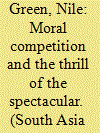

|
|
|
|
|
| Publication |
2008.
|
| Summary/Abstract |
At 10:15 on the night of 31 May 1903, the D-block of the recently completed Sita Ram Building in Bombay suddenly came down with a crash. Most of the building was unoccupied, but on the ground floor was a saloon bar, which over the past months had done a brisk trade with British soldiers and sailors. The customers of this bar comprised most of the dead and injured when the building collapsed.
Since the bar stood across the road from the tomb of a Muslim saint, rumours spread that the disaster was the direct result of the insult to the holy man and implicitly of the transgression of Muslim space by the combined efforts of the Hindu bar-owner and his bibulous patrons. This short essay explores the moral tensions that found expression with the collapse of the Sita Ram Building through a comparison of its reportage in an English-language newspaper and an Urdu hagiography of the offended saint. At the same time, it draws attention to the neglected importance of colonial Bombay as a prime location of the early Muslim experience of globalising modernity
|
|
|
|
|
|
|
|
|
|
|
|
|
|
|
|
| 12 |
ID:
121900
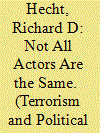

|
|
|
|
|
| Publication |
2013.
|
| Summary/Abstract |
Gideon Aran and Ron Hassner begin their article on "Religious Violence in Judaism: Past and Present" by noting different scholarly ways to think about the relationships between religion and violence. First, there are those who believe that religion is inherently violent and thereby trivialize history and reduce the agency of actors belonging to religion. Second, there are those who argue certain religions have a violent core and other religious traditions are inherently peaceful. They too strip the actors within these traditions of responsibility or agency. They are violent or peaceful because that is the nature of their religious traditions. Third, there are those who argue in a classic instrumentalist view in which religion is a very effective system to either mobilize people to act violently or to justify the violence.
|
|
|
|
|
|
|
|
|
|
|
|
|
|
|
|
| 13 |
ID:
080366
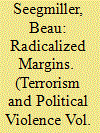

|
|
|
|
|
| Publication |
2007.
|
| Summary/Abstract |
In recent years we have witnessed a growing body of scholarship that asserts that religion often motivates violence; anti-abortion violence is presented as a prominent example. Through examining the rhetoric and actions of anti-abortion bomber Eric Rudolph, I question the centrality of religion when invocations of divine authority or apocalyptic narratives are conspicuously absent in his justificatory writings. I argue that other social, political, and strategic considerations are more significant in the emergence of a radicalized anti-abortion movement than religion. This analysis nuances notions of a causal relationship between religion and violence and calls for interrogation of the category
|
|
|
|
|
|
|
|
|
|
|
|
|
|
|
|
| 14 |
ID:
127184
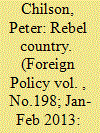

|
|
|
| 15 |
ID:
170475
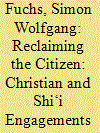

|
|
|
|
|
| Summary/Abstract |
At first glance, Christians and Shi‘is occupy starkly differing socio-economic and religious positions in Pakistani society. Yet, this article argues that both communities share some remarkable similarities in their engagement with the seemingly hostile Pakistani state. Both Christians and Shi‘is have not given up on claiming their stakes as full citizens of the nation despite repeated attempts by parts of the majority population to ostracise and exclude them. I show how they continue to re-read the early history of Pakistan, attempt to prove their unwavering loyalty to the state, try to build bridges with the majority community and, finally, portray themselves as being a spiritual elite that still guarantees the initial promise of Pakistan.
|
|
|
|
|
|
|
|
|
|
|
|
|
|
|
|
| 16 |
ID:
171184
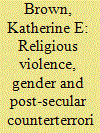

|
|
|
|
|
| Summary/Abstract |
This article argues that despite the framing of religion in the discipline and practice of International Relations (IR) as a force for good, or a cause of evil in the world, IR fails to treat religion on its own terms (as sui generis). With a few exceptions, the discipline has pigeonholed religion as a variable of IR, one that can be discussed as one might GDP, HIV, or numbers of nuclear missiles: measurable, with causality and essential properties. IR has also tended to treat religion as equivalent to features of global politics that it already recognizes—as an institution or community or ideology, for example—but in doing so, it misses intrinsic (and arguably unique) elements of religion. Drawing on feminist insights about how gender works in IR, namely that gender is a construct, performative and structural, this article argues a similar case for religion. A reframing of religion is applied to the case of Daesh (so-called Islamic State of Iraq and Syria, ISIS) to show how our understanding of the organization changes when we view religion differently. The implications for counterterrorism policies if religion is viewed as more than a variable are explored in light of recent territorial and military losses for Daesh. The article therefore proposes a post-secular counterterrorism
|
|
|
|
|
|
|
|
|
|
|
|
|
|
|
|
| 17 |
ID:
128312
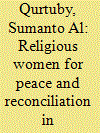

|
|
|
|
|
| Publication |
2014.
|
| Summary/Abstract |
Sumanto Al Qurtuby, discusses how women bridged the Muslim/Christian religious divide that had brought interreligious conflict to eastern Indonesia during a transition to greater democracy after the downfall of Suharto in 1988. The author argues that it is wrong to assume that all women promote peace. In Indonesia, many women fought to support the triumph of their own religion through violence. However, some of these women combatants abandoned violence and joined the interfaith peacebuilding efforts of others after they began to take traction.
|
|
|
|
|
|
|
|
|
|
|
|
|
|
|
|
| 18 |
ID:
121899
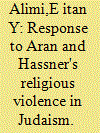

|
|
|
|
|
| Publication |
2013.
|
| Summary/Abstract |
The editors of Terrorism and Political Violence have been right to place Aran and Hassner's "Religious Violence in Judaism: Past and Present" at the center of this issue, and to solicit a scholarly debate around this important piece. As a political sociologist who is not indifferent to either Jewish religious violence in particular or the study of political violence and terrorism in general, I can easily think of several reasons. The first reason is that Aran and Hassner's explanatory framework is dynamic and context-sensitive; the second concerns the impressive balance between and attentiveness to violent and nonviolent elements in religion; and, the third reason relates to the timeliness of the topic of Jewish religious violence. In what follows, I critically evaluate the first two reasons, and in concluding refer to the third one. It should be pointed out that the underlying motif that "connects the dots" of my response relates to the relative neglect of "relational aspects" in Aran and Hassner's framework, and on which I say more below.
|
|
|
|
|
|
|
|
|
|
|
|
|
|
|
|
| 19 |
ID:
144084
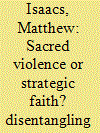

|
|
|
|
|
| Summary/Abstract |
Why are religious conflicts more violent than non-religious conflicts? Research has argued that religion pushes partisans toward violence. However, existing research suffers from widespread problems of measurement validity and fails to confront the possibility of endogeneity in the relationship between religion and violence. This article develops a more precise measure of the relevance of religion to conflict based on the use of religious rhetoric by political organizations. With this approach in mind, this article disentangles the causal sequence linking religious rhetoric and violence using annually coded data on the rhetoric of 495 organizations worldwide from 1970 through 2012. The analysis finds a strong general correlation between religious rhetoric and violence. However, past use of religious rhetoric does not increase the likelihood that an organization will participate in violence or the overall intensity of conflict. On the contrary, previous participation in violence makes an organization more likely to adopt religious rhetoric for mobilization. Indeed, religious rhetoric becomes more likely as violence increases in intensity and conflict continues for longer periods of time. These findings suggest that violent actors adopt religious rhetoric to solve the logistical challenges associated with violence, including access to mobilizing resources and recruitment and retention of members. This article contributes to the study of religious conflict by providing evidence of endogeneity in the relationship between religion and violence and highlighting the need for temporally sensitive measures of religious mobilization.
|
|
|
|
|
|
|
|
|
|
|
|
|
|
|
|
| 20 |
ID:
158486
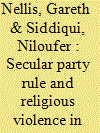

|
|
|
|
|
| Summary/Abstract |
Does secular party incumbency affect religious violence? Existing theory is ambiguous. On the one hand, religiously motivated militants might target areas that vote secularists into office. On the other hand, secular party politicians, reliant on the support of violence-hit communities, may face powerful electoral incentives to quell attacks. Candidates bent on preventing bloodshed might also sort into such parties. To adjudicate these claims, we combine constituency-level election returns with event data on Islamist and sectarian violence in Pakistan (1988–2011). For identification, we compare districts where secular parties narrowly won or lost elections. We find that secularist rule causes a sizable reduction in local religious conflict. Additional analyses suggest that the result stems from electoral pressures to cater to core party supporters and not from politician selection. The effect is concentrated in regions with denser police presence, highlighting the importance of state capacity for suppressing religious disorder.
|
|
|
|
|
|
|
|
|
|
|
|
|
|
|
|
|
|
|
|
|